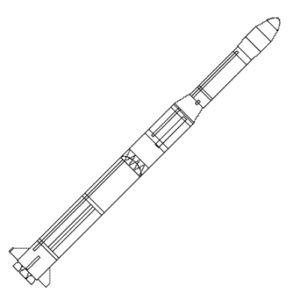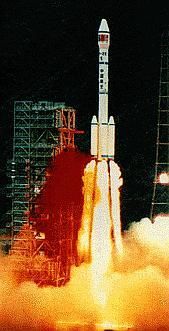
Home - Search - Browse - Alphabetic Index: 0- 1- 2- 3- 4- 5- 6- 7- 8- 9
A- B- C- D- E- F- G- H- I- J- K- L- M- N- O- P- Q- R- S- T- U- V- W- X- Y- Z
Chang Zheng 2E
 CZ-2E |
AKA: Chang Zheng-2E;CZ-2E;Long March 2E. Status: Retired 1995. First Launch: 1990-07-16. Last Launch: 1995-12-28. Number: 7 . Payload: 9,200 kg (20,200 lb). Thrust: 5,920.00 kN (1,330,860 lbf). Gross mass: 460,000 kg (1,010,000 lb). Height: 49.70 m (163.00 ft). Diameter: 3.35 m (10.99 ft). Apogee: 200 km (120 mi).
The CZ-2E was based on the mature technology of previous versions of the Long March launch vehicles. Wang Uongzhi was the Chief Designer for the vehicle. With a solid Perigee Kick Motor (EPKM, built by Hexi Company, China), the CZ-2E could put 3,500 kg into a geosynchronous transfer orbit. In May 2001 it was announced that another upper stage, the ETS was being developed for the CZ-2E. This would be an adaptation of the CTS of the CZ-2C, consisting of a Spacecraft Adapter and an Orbital Maneuver System.
Launch event sequence:
Event TIME (sec.) Liftoff 0.0 Pitch over 11.0 Booster engine shutoff 125.8 Booster separation 127.3 First Stage Engine Shutoff 158.9 First/Second Stage Separation 160.4 Jettisoning of Fairing 200.4 Second Stage Main Engine Shutoff 459.9 Vernier Engine Shutoff (LEO injection) 572.9 Start of re-orientation 582.9 End of re-orientation 582.9+Tr Ignition of spin-up rockets 582.9+Tr+10.0 End of spin-up 582.9+Tr+10.5 Payload separation 582.9+Tr+10.7 Ignition of tumbling rocket 582.9+Tr+14
LEO Payload: 9,200 kg (20,200 lb) to a 200 km orbit at 28.00 degrees. Payload: 3,370 kg (7,420 lb) to a GTO with solid kick stage.. Launch Price $: 50.000 million in 1999 dollars.
Stage Data - CZ-2E
- Stage 0. 4 x CZ-2E-0. Gross Mass: 41,000 kg (90,000 lb). Empty Mass: 3,200 kg (7,000 lb). Thrust (vac): 816.285 kN (183,508 lbf). Isp: 291 sec. Burn time: 128 sec. Isp(sl): 261 sec. Diameter: 2.25 m (7.38 ft). Span: 2.26 m (7.41 ft). Length: 15.33 m (50.29 ft). Propellants: N2O4/UDMH. No Engines: 1. Engine: YF-20B. Other designations: LB-40. Status: In Production.
- Stage 1. 1 x CZ-2E-1. Gross Mass: 196,500 kg (433,200 lb). Empty Mass: 9,500 kg (20,900 lb). Thrust (vac): 3,265.143 kN (734,033 lbf). Isp: 289 sec. Burn time: 166 sec. Isp(sl): 261 sec. Diameter: 3.35 m (10.99 ft). Span: 6.00 m (19.60 ft). Length: 23.70 m (77.70 ft). Propellants: N2O4/UDMH. No Engines: 4. Engine: YF-20B. Other designations: L-180. Status: In Production.
- Stage 2. 1 x CZ-2E-2. Gross Mass: 91,500 kg (201,700 lb). Empty Mass: 5,500 kg (12,100 lb). Thrust (vac): 831.005 kN (186,817 lbf). Isp: 298 sec. Burn time: 295 sec. Isp(sl): 260 sec. Diameter: 3.35 m (10.99 ft). Span: 3.35 m (10.99 ft). Length: 15.52 m (50.91 ft). Propellants: N2O4/UDMH. No Engines: 1. Engine: YF-25/23. Other designations: L-90. Status: In Production.
- Stage 3. 1 x EPKM. Gross Mass: 5,985 kg (13,194 lb). Empty Mass: 541 kg (1,192 lb). Thrust (vac): 117.000 kN (26,302 lbf). Isp: 298 sec. Burn time: 135 sec. Diameter: 1.70 m (5.50 ft). Span: 2.50 m (8.20 ft). Length: 3.10 m (10.10 ft). Propellants: Solid. No Engines: 1. Engine: EPKM. Status: In Production. Comments: Perigee kick motor for putting CZ-2E payloads into geosynchronous transfer orbit. Thrust, burn time estimated. Specific impulse calculated based on motor payload/delta v performance and masses.
More at: Chang Zheng 2E.
Family: orbital launch vehicle. Country: China. Engines: YF-25/23, YF-20B. Spacecraft: Apstar, HS 601, Badr, AS 7000. Projects: Asiasat. Launch Sites: Xichang, Xichang LC2. Stages: Perigee Orbit Transfer Motor, CZ-2E-1, CZ-2E-2, EPKM, LB-40. Agency: Aussat, CALT, Echostar.
 | CZ-2E |
 | CZ-2E Credit: © Mark Wade |
 | LM-2E Launch photo of Long March LM-2E launch vehicle. |
1990 July 16 - . 00:40 GMT - . Launch Site: Xichang. Launch Complex: Xichang LC2. LV Family: CZ. Launch Vehicle: Chang Zheng 2E.
- Badr-A - . Payload: Badr 1 + R&D. Mass: 52 kg (114 lb). Nation: Pakistan. Agency: Suparco. Class: Technology. Type: Communications technology satellite. Spacecraft: Badr. Decay Date: 1990-12-08 . USAF Sat Cat: 20685 . COSPAR: 1990-059A. Apogee: 988 km (613 mi). Perigee: 208 km (129 mi). Inclination: 28.50 deg. Period: 96.70 min. First launch of new Chinese launch vehicle. Experimental Pakistani payload..
- HS-601 Model - . Mass: 3,400 kg (7,400 lb). Nation: China. Agency: PRC. Spacecraft: HS 601. COSPAR: 1990-059xx. First launch of new Chinese launch vehicle..
1992 August 13 - . 23:00 GMT - . Launch Site: Xichang. Launch Complex: Xichang LC2. LV Family: CZ. Launch Vehicle: Chang Zheng 2E.
- Optus B1 - .
Payload: Aussat B1. Mass: 2,760 kg (6,080 lb). Nation: Australia.
Agency: Optus.
Program: Aussat.
Class: Communications.
Type: Military communications satellite. Spacecraft: HS 601.
USAF Sat Cat: 22087 . COSPAR: 1992-054A. Apogee: 35,800 km (22,200 mi). Perigee: 35,774 km (22,228 mi). Inclination: 0.00 deg. Period: 1,436.10 min.
Stationed at 160 deg E. Commercial communications. Longitude 160 +/- 0.05 deg E. Launched fromn China. Positioned in geosynchronous orbit at 160 deg E in 1992-1999 As of 1 September 2001 located at 159.98 deg E drifting at 0.009 deg W per day. As of 2007 Mar 11 located at 163.63E drifting at 0.044E degrees per day.
1992 December 21 - . 11:21 GMT - . Launch Site: Xichang. Launch Complex: Xichang LC2. LV Family: CZ. Launch Vehicle: Chang Zheng 2E. FAILURE: Shortcomings in the guidance system lead to the vehicle not anticipating the true effects of horizontal wind-shear once the mountains surrounding the launch site were cleared. This caused the nose fairing to collapse 45 seconds after launch.. Failed Stage: G.
- Aussat B2 / Optus B2 - . Payload: Optus B2 / Star 63F. Mass: 2,760 kg (6,080 lb). Nation: Australia. Agency: Hughes. Program: Aussat. Class: Communications. Type: Military communications satellite. Spacecraft: HS 601. Decay Date: 1995-06-29 . USAF Sat Cat: 22278 . COSPAR: 1992-090A. Apogee: 816 km (507 mi). Perigee: 206 km (128 mi). Inclination: 28.10 deg. Period: 94.90 min. Despite collapse of the nose fairing and near-desctruction of the payload, the launch vehicle continued on to place the wreckage of Optus-B2, and the Star-63F Kick-Motor into low earth orbit..
1994 August 27 - . 23:10 GMT - . Launch Site: Xichang. Launch Complex: Xichang LC2. LV Family: CZ. Launch Vehicle: Chang Zheng 2E.
- Optus B3 - .
Mass: 2,760 kg (6,080 lb). Nation: Australia.
Agency: Optus.
Program: Aussat.
Class: Communications.
Type: Military communications satellite. Spacecraft: HS 601.
USAF Sat Cat: 23227 . COSPAR: 1994-055A. Apogee: 35,855 km (22,279 mi). Perigee: 35,718 km (22,194 mi). Inclination: 0.00 deg. Period: 1,436.10 min.
Telephone; TV; mobile communications; air traffic control. Stationed at 156 deg deg E. Positioned in geosynchronous orbit at 152 deg E in 1994-1995; 156 deg E in 1995-1999 As of 5 September 2001 located at 156.00 deg E drifting at 0.007 deg W per day. As of 2007 Mar 9 located at 151.97E drifting at 0.007W degrees per day.
1995 January 25 - . 22:40 GMT - . Launch Site: Xichang. Launch Complex: Xichang LC2. LV Family: CZ. Launch Vehicle: Chang Zheng 2E. FAILURE: Shortcomings in the guidance system lead to the vehicle not anticipating the true effects of horizontal wind-shear once the mountains surrounding the launch site were cleared. This caused the nose fairing to collapse and the spacecraft to be destroyed.. Failed Stage: G.
- Apstar 2 - .
Mass: 2,830 kg (6,230 lb). Nation: China.
Agency: PRC.
Program: Apstar.
Class: Communications.
Type: Civilian communications satellite. Spacecraft: HS 601.
Decay Date: 1995-01-25 .
Because the Apstar failure happened a few seconds later than Optus, the consequences were catastrophic. The vehicle was destroyed, and the falling wreckage landed on a village down-range of the launch site, killing at least 20 and perhaps as many as 120 people.
1995 November 28 - . 11:30 GMT - . Launch Site: Xichang. Launch Complex: Xichang LC2. LV Family: CZ. Launch Vehicle: Chang Zheng 2E.
- Asiasat 2 - .
Mass: 3,485 kg (7,683 lb). Nation: China.
Agency: Asiasat.
Manufacturer: Lockheed.
Program: Asiasat.
Class: Communications.
Type: Civilian communications satellite. Spacecraft: AS 7000.
USAF Sat Cat: 23723 . COSPAR: 1995-064A. Apogee: 35,798 km (22,243 mi). Perigee: 35,777 km (22,230 mi). Inclination: 0.40 deg. Period: 1,436.20 min.
TV; 24 C-band and 9 Ku-band transponders. Stationed at 100.5 deg E. Positioned in geosynchronous orbit at 100 deg E in 1995-1999 As of 5 September 2001 located at 100.49 deg E drifting at 0.015 deg W per day. As of 2007 Mar 9 located at 100.49E drifting at 0.011W degrees per day.
1995 December 28 - . 11:50 GMT - . Launch Site: Xichang. Launch Complex: Xichang LC2. LV Family: CZ. Launch Vehicle: Chang Zheng 2E.
- Echostar 1 - .
Mass: 3,288 kg (7,248 lb). Nation: USA.
Agency: TCI.
Manufacturer: Lockheed.
Program: Echostar.
Class: Communications.
Type: Civilian communications satellite. Spacecraft: AS 7000.
USAF Sat Cat: 23754 . COSPAR: 1995-073A. Apogee: 35,796 km (22,242 mi). Perigee: 35,777 km (22,230 mi). Inclination: 0.00 deg. Period: 1,436.10 min.
16 Ku-band transponders. Stationed at 119 deg W. Positioned in geosynchronous orbit at 119 deg W in 1996-1999 As of 5 September 2001 located at 147.96 deg W drifting at 0.007 deg E per day. As of 2007 Mar 9 located at 148.10W drifting at 0.008W degrees per day.
Back to top of page
Home - Search - Browse - Alphabetic Index: 0- 1- 2- 3- 4- 5- 6- 7- 8- 9
A- B- C- D- E- F- G- H- I- J- K- L- M- N- O- P- Q- R- S- T- U- V- W- X- Y- Z
© 1997-2019 Mark Wade - Contact
© / Conditions for Use